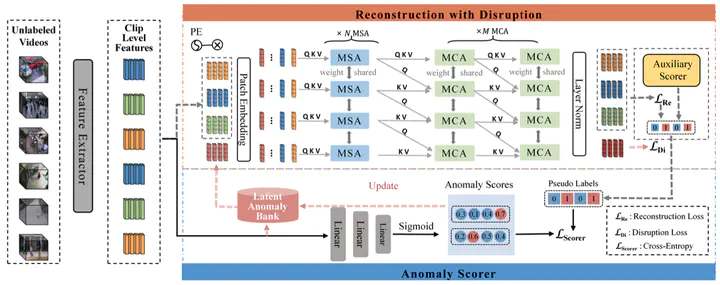 Illustration
Illustration
摘要
Unsupervised video anomaly detection (UVAD) has gained significant attention due to its label-free nature. Typically, UVAD methods can be categorized into two branches, i.e. the one-class classification (OCC) methods and fully UVAD ones. However, the former may suffer from data imbalance and high false alarm rates, while the latter relies heavily on feature representation and pseudo-labels. In this paper, a novel feature reconstruction and disruption model (FRD-UVAD) is proposed for effective feature refinement and better pseudo-label generation in fully UVAD, based on cascade cross-attention transformers, a latent anomaly memory bank and an auxiliary scorer. The clip features are reconstructed using the space-time intra-clip information, as well as cross-inter-clip knowledge. Moreover, instead of blindly reconstructing all training features as OCC methods, a new disruption process is proposed to cooperate with the feature reconstruction simultaneously. Using the collected pseudo anomaly samples, it is able to emphasize the feature differences between normal and abnormal events. Additionally, a pre-trained UVAD scorer is utilized as a different criteria for anomaly prediction, which further refines the pseudo-labels. To demonstrate its effectiveness, comprehensive experiments and detailed ablation studies are conducted on three video benchmarks, namely CUHK Avenue, ShanghaiTech and UCF-Crime. Our proposed model (FRD-UVAD) achieves the best AUC performance (91.23%, 80.14%, and 82.12%) on all three datasets, surpassing other state-of-the-art OCC and fully UVAD methods. Furthermore, it obtains the lowest false alarm rate with a lower scene dependency, compared with other OCC methods.